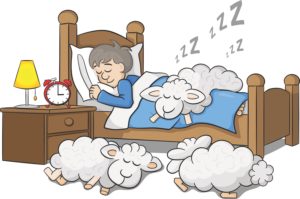Trouble Sleeping?

© AntiMartina | Getty Images
If you’ve been counting sheep for more nights than you’d like, you’re in good company. Lack of sleep is a common problem for a lot of people. Without a good night’s sleep, we’re often cranky, clumsy, and can’t concentrate. Exercise may seem like the last thing you want to do when you’re already tired. But according to the National Sleep Foundation, physical activity can help alleviate daytime sleepiness and, for some people, reduce the need for sleep medications.
“Exercising during the day is an excellent way to improve sleep at night,” says sleep specialist Joshua Roland, MD, UCLA Medical Center. “Often, modern lifestyles can be rather sedentary, and then we wonder why we aren’t tired when we lie down at night. Studies have shown that exercise can improve sleep quality, reduces how long it takes to fall asleep, and positively impact sleep disorders, such as obstructive sleep apnea. However, it is important to allow yourself several hours after exercising to wind down before bed.”
Sleep is vital for overall well-being and a well-functioning immune system. While we slumber there’s a lot going on, including tissue repair and restoration, memory consolidation, and removal clutter from the brain. Without ample rest, the risk of diseases, such as cardiovascular disease, diabetes, and even some cancers, goes up.
The Benefits of Cardio
There are a lot of studies demonstrating that cardiovascular exercise is beneficial for sleep. An analysis of more than 2,600 men and women ages, 18 to 85, showed that people who met the U.S. physical activity guidelines of a minimum of 150 minutes of moderate-intensity aerobic exercise a week (30 minutes per day for five days) slept significantly better and felt more alert during the day. Exercise also helped reduce leg cramps. Moreover, a study published last year in the British Journal of Sports Medicine analyzed data on 380,055 people and found that a combination of poor sleep and lack of exercise was associated with a greater risk of death over an 11-year-follow-up period compared with good-quality sleep and high levels of physical activity.
Resistance Training
But it’s not just cardio that improves sleep. Data presented at the American Heart Association’s Epidemiology, Prevention, Lifestyle, and Cardiometabolic Health recent conference suggests that resistance training over 12 months may improve sleep duration to an even greater extent. Hand weights, resistance bands, Pilates and some types of yoga are ways to add resistance training to your life. Not only will you sleep better, but you’ll also be stronger, and that can be quite invigorating.
Get Better Together
When you promise someone else that you will show up to exercise, it’s a lot harder to bail at the last minute. So, sign up for a competition, join a walking group, or get a workout partner. Committing to a class, another person, or a time-bound event helps a lot of people get and stay in shape. It also builds friendships and support systems. Here are some ideas to try:
The National Senior Games
(nsga.com) is held every two years and is the largest senior multi-sport event in the world. The next biennial event takes place in 2023 in Pittsburgh, PA. To participate in the national games, you need to qualify at local state games before the end of this year.
USA Triathlon (TeamUSA.org) has developed an indoor triathlon program called USATri60 to introduce people to the sport of triathlon. These events are held at area YMCAs, community centers and health clubs. TeamUSA.org is the go-to site for learning about the sports, and finding events, local clubs, and coaches. You can also download a triathlete training guide that provides an eight-week beginner-level weekly workout plan.
Walk to Cure Arthritis
(walktocurearthritis.org) is the Arthitis Foundation’s annual 5K walking event. Most events take place in May during National Arthritis Month.
Moving Your Way
Exercise need not be expensive or complicated. You can do it at home, and by vigorously walking around your neighborhood. Just 30 minutes a day can make a difference.
Building the exercise habit isn’t always easy, but once the habit is formed, you may be surprised how much you look forward to it. Set a goal to exercise most days of the week for at least six weeks and see how you feel. In a relatively short period of time most people realize how much better it feels to live in a body that is more fit and flexible.
“The bottom line, says Dr. Roland, “is to find an exercise activity that you enjoy and can stick with, and it will likely have a positive impact on your sleep.”
The post Trouble Sleeping? appeared first on University Health News.

